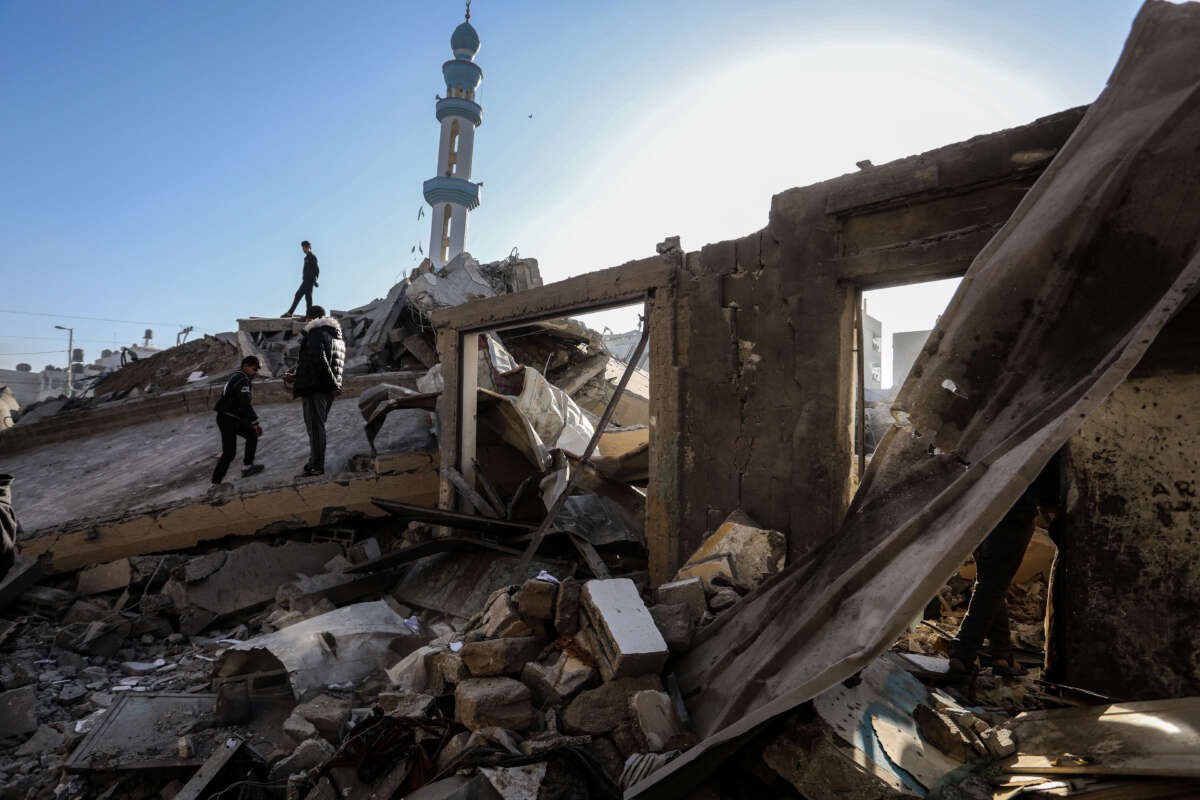Support justice-driven, accurate and transparent news — make a quick donation to Truthout today!
Israeli airstrikes on the severely overcrowded Gaza city of Rafah on Thursday destroyed a mosque and several houses as the leaders of aid groups and key United Nations agencies issued their latest warning over deteriorating humanitarian conditions across the Palestinian territory.
Reuters reported that Rafah residents described the latest flurry of Israeli attacks as “one of their worst nights yet.”
“Mourners wailed over at least seven corpses in body bags, laid out on cobbles outside a morgue in the city,” the outlet reported. “Gaza health authorities said 97 people were confirmed killed and 130 wounded in the last 24 hours of Israeli assaults, but most victims were still under rubble or in areas rescuers could not reach. The al-Farouk mosque in the center of Rafah was flattened into slabs of concrete, the facades of adjacent buildings blasted away.”
Rafah is currently home to around 1.5 million people, most of whom fled to the small city from elsewhere in the Gaza Strip to escape Israeli bombs and ground forces — only to face airstrikes and the threat of a ground assault not long after arriving. Starvation and disease are spreading rapidly in the city, which rests near Gaza’s border with Egypt.
Israeli officials have said they intend to launch an invasion of Rafah as soon as next month if Hamas does not release the remaining hostages.
The Inter-Agency Standing Committee (IASC), a humanitarian coordination forum established by the U.N. General Assembly, said in a statement Wednesday that a “further escalation of violence” in Rafah “would cause mass casualties” and “could also deal a death blow to a humanitarian response that is already on its knees.”
“Diseases are rampant. Famine is looming. Water is at a trickle,” said the IASC. “Basic infrastructure has been decimated. Food production has come to a halt. Hospitals have turned into battlefields. One million children face daily traumas.”
The committee argued that while food aid and other necessities are desperately needed in Rafah and throughout the enclave, “no amount of humanitarian response will make up for the months of deprivation that families in Gaza have endured.”
To “salvage the humanitarian operation” and provide “bare essentials,” the IASC called for an immediate cease-fire, the restoration of funding for the UNRWA, the release of hostages, security assurances for aid workers, and “a halt to campaigns that seek to discredit the United Nations and non-governmental organizations doing their best to save lives.”
“Humanitarian agencies remain committed, despite the risks. But they cannot be left to pick up the pieces,” the committee said. “We are calling on Israel to fulfill its legal obligation, under international humanitarian and human rights law, to provide food and medical supplies and facilitate aid operations, and on the world’s leaders to prevent an even worse catastrophe from happening.”
How many more times must we remind that:
— Philippe Lazzarini (@UNLazzarini) February 22, 2024
– There is no safe place in #Gaza.
– Diseases are rampant.
– Famine is looming.
– Water is at a trickle.
– Food production has come to a halt.
– Hospitals have turned into battlefields.
– One million children face daily traumas.
I join… https://t.co/r5CGv9Rigw
Israel’s latest bombardment of Rafah came days after the U.S. vetoed a cease-fire resolution at the U.N. Security Council for the third time since October 7.
The New York Times reported Wednesday that a Hamas delegation was in Cairo earlier this week “to discuss efforts to end the war with Egyptian officials.”
Israeli Prime Minister Benjamin Netanyahu rejected a proposed four-and-a-half-month truce earlier this month, but Benny Gantz — a member of Netanyahu’s war cabinet — said Wednesday that “initial signs indicate a possibility of moving forward” with a cease-fire agreement.
In a social media post late Wednesday, U.N. Secretary-General António Guterres pointed to rising malnutrition in Gaza and wrote that “an immediate humanitarian cease-fire is the only way to scale up the delivery of aid to those who need it most.”
Press freedom is under attack
As Trump cracks down on political speech, independent media is increasingly necessary.
Truthout produces reporting you won’t see in the mainstream: journalism from the frontlines of global conflict, interviews with grassroots movement leaders, high-quality legal analysis and more.
Our work is possible thanks to reader support. Help Truthout catalyze change and social justice — make a tax-deductible monthly or one-time donation today.
